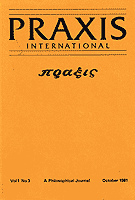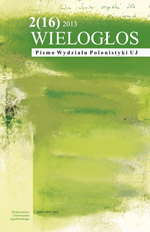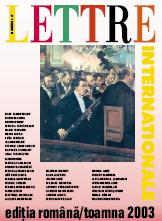
We kindly inform you that, as long as the subject affiliation of our 300.000+ articles is in progress, you might get unsufficient or no results on your third level or second level search. In this case, please broaden your search criteria.


L'auteur cherche à analyser la structure et les tendances de crise des sociétés contemporaines de type soviétique (sociétés d'Europe orientale). J'essaie de montrer comment ce système est à la fois "irrationnel" et "rationnel". Il est "irrationnel" dans la mesure où il mène au gaspillage et à l'inefficacité économique endémiques. Ce n'est pas simplement un trait fortuit du système mais une partie intégrante de son fonctionnement. Mais cette forme d' "irrationalité" apparaît "rationnelle" dès qu'on pénètre jusqu'à la fonction objective de but de ce type de système. La fonction de but de ce type de société est proprement politique — c'est une forme de domination sociale qui ne se limite pas à la sphère d'économie proprement dite mais qui renferme toutes les fermes d'interaction sociale. Pour peu qu'on comprenne cette fonction de but et la façon dont elle affecte la structure toute entière, on peut voir comment ce qui apparaît "irrationnel" d'un simple point de vue économique devient intelligible et "rationnel". Le système analysé, cependant, est fondamentalement instable et crée son propre déséquilibre — lequel encourage les tendances à la crise dans ces sociétés de commandement. Der Autor versucht, Struktur und Krisentendenzen der zeitgenössischen Gesellschaften des sowjetischen Typs (d.h. der osteuropäischen Gesellschaften) zu analysieren. Er versucht zu zeigen, inwiefern dieses System zugleich "irrational" und "rational" ist. Es ist "irrational", insofern es zu notorischer Verschwendung und zu ökonomischer Ineffizienz führt. Hierbei handelt es sich nicht einfach um zufällige Begleiterscheinungen eines solchen Systems, sondern vielmehr um einen integralen Bestandteil seines Funktionierens. Aber diese Form der "Irrationalität" kann auch als "rational" angesehen werden, sobald die objektive Zielfunktion dieser Art von System mit in Betracht gezogen wird.
More...
L'auteur cherche à clarifier la nature précise de la crise et du dilemme des États-providence contemporains. Il soutient que les théories classiques de la crise économique ne suffisent pas à rendre compte de l'État-providence contemporain et de ses instabilités naturelles. Après l'analyse de ce qui est caractéristique de la crise de l'État-providence et des phénomènes de crises propres à cette forme de capitalisme, j'examine trois "solutions" possibles aux dilemmes de l'État-providence. Ce sont la "solution" conservatrice qui vis à la destruction de l'État-providence; la "solution" sociale-démocrate qui consiste en un modèle corporatiste de politique; et la "solution" radicale démocrate fondée sur l'idée de participation et d'économie autonome. Les faiblesses des deux premiers types de "solution" font l'objet d'une discussion, surtout en ce qui concerne les zones de conflit du sous-emploi et de l'écologie. Malgré l'absence d'un agent politique pour amener une solution démocratique radicale, celle-ci paraît plus raisonnable et plausible er comparaison avec les faiblesses des deux autres solutions. Der Autor versucht, den spezifischen Charakter der Krise und des Dilemmas der modernen Wohlfahrtsstaaten zu erhellen. Er versucht zu zeigen, daß die klassischen Theorien der ökonomischen Krise für ein Verständnis des modernen Wohlfahrtsstaates und der ihm inhärenten Instabilitäten nicht angemessen sind. Nach einer Analyse der Grundmerkmale von Krisen und Krisenphänomenen in der wohlfahrtsstaatlichen Form des Kapitalismus untersucht der Autor drei mögliche "Lösungen" der Dilemmata des Wohlfahrtsstaates: die konservative "Lösung", welche die Zerstörung des Wohlfahrtsstaates zum Ziel hat, die sozialdemokratische Lösung, der ein korporatistisches Modell der Politik zugrunde liegt, und die radikal-demokratische Lösung, die auf der Idee der Partizipation und der ökonomischen Selbstverwaltung basiert.
More...
The article discusses Bruno Schulz’s attitude toward politics. It is well known that the author of The Cinnamon Shops was a nonpolitical man. This was the reason for some fi erce attacks against his prose conducted by politically engaged literary critics in the interwar Poland. The author mentions these attacks but he also analyzes Schulz’s less known essays about Piłsudski, Aragon and Brecht, and the way Schulz pictured politics in his prose. It seems that a political dictionary of the author of The Street of Crocodiles comprised terms from different political ideologies; he alluded to Marx, anarchism and Brzozowski. At the end of his article the author discusses the question whether Schulz’s nonpolitical attitude could be compared to the so called conservative revolution in Germany after World War I.
More...
Zimbawbe – former South Rhodesia – has had a troubled history since 1980 when it won its independence. The author compares its present situation with that of South Rhodesia, a comparison that does not favor Zimbawbe, and at the same time offers an objective view o the social, economic and political situation during the domination of white colonizers
More...
A reportage on the present situation in Iran, where the so-called bourgeois circles but also the poor layers of the society challenge the government, and where political figures close to President Khatami back him up in his effort to reform the system without destroying it.
More...
A short essay on the books read by the author, that represented cultural landmarks along his life, among which Camus’ “The Stranger”.
More...
Moving pages on the Warsaw ghetto where the author spent past of his childhood, and on his and his family’s ordeals as escapees, obliged to live hidden in an attic, in a permanent state of fear not to be discovered.
More...
Staring from Catherine Merridale’s volume ‘Nights of Stone – Death and Memory in Russia, the author comments on the political violence in Russia, that has marred its history along the past century. The Russians’ relation to death, the radical students’ movements, the role played by the Orthodox church, the position of the main publications as regards the situation of the ordinary people, the Stalinist terror are topics of the interviews taken by Merridale and representing the essence of her book.
More...
How can one speak of enemies and not hate them? A question that the author tries to answer evoking several figures of the twentieth century who represented or still represent a real threat for humanity or became detested killers of mankind.
More...
An essay on the specific difference between enemy and foe, which is similar to that between “discord” and war. The historic references offer examples such as d’Artagnan, Richelieu, Hindenburg, Hitler. The author concludes: Don’t love the enemy, but forgive the foe who might prove your future ally.
More...


An article on the detective serials produced in Russia and broadcasted by Russian TV stations, explaining their success with the public. Mass media becomes thus a powerful tool for mass manipulation.
More...
The author recalls his discussion with Emil Cioran in Paris. The meeting was occasioned by the author’s intention to write an essay on Benjamin Fondane
More...
The difficulty to talk about populism comes from the fact that the concept itself is deprecating, although for some it is synonymous with democracy. Starting from this dilemma, the author offers some notes on populism, giving examples of the concept as viewed by several political figures of our days.
More...
An essay on Oriana Fallaci’s “la Rabbia e L’orgoglio”, a book about America and terrorism, about open societies and totalitarian regimes, the relations between the West and the Muslim world. The book was written after the September 11 terrorist attacks and since then it has aroused passionate controversies because it expresses the author’s admiration for the American people.
More...

Three articles written by various authors on the notions of half-castes and Creoles.
More...
An essay on the Oder river, a witness of Poland’s history, but also the author’s “companion” in her childhood and youth.
More...